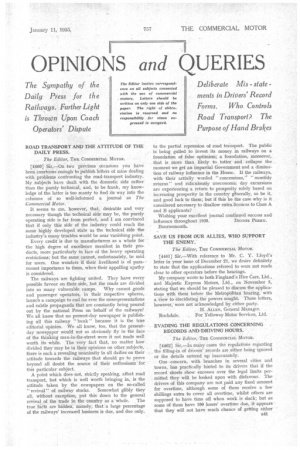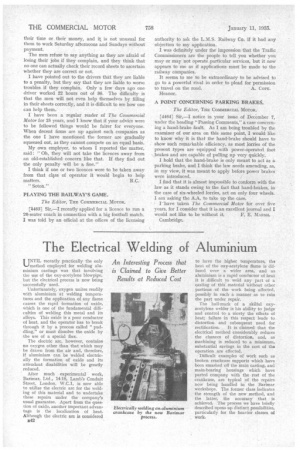OPINIONS and QUERIES
Page 59

Page 60

If you've noticed an error in this article please click here to report it so we can fix it.
ROAD TRANSPORT AND THE ATTITUDE OF THE DAILY PRESS.
The Editor, THE COMMERCIAL MOTOR.
[4460] Sir,—On two previous otcasions you' have been courteous enough to publish letters of mine dealing with problems confronting the road-transport industry. My :subjects have dealt with the domestic side rather than the purely technical, and, to be frank, my knowledge of the latter is too scanty to find its way into the columns of so well-informed a journal as The Commercial Motor.
It seems to me, however, that, desirable and very necessary though the technical side may be, the purely operating side is far from perfect, and I am convinced that if only this side of the industry could reach the same highly developed state as the technical side the industry's many troubles would be near vanishing point Every credit is due to manufacturers as a whole for the high degree of excellence manifest in their products, more particularly in face of the heavy operating restrictions; but the same cannot, unfortunately, be said for users. One wonders if their livelihood is of paramount importance to them, when their appalling apathy is considered.
The railways are fighting united. They have every possible favour on their side, but the roads are divided into so many vulnerable camps. Why cannot goods and passenger operators, in their respective spheres, launch a campaign to end for ever the misrepresentations and subtle propaganda that are constantly being poured out by the national Press on behalfof the railways? We all know that no present-day newspaper is publishing all this railway " bunk" because it is the true editorial opinion. We all know, too, that the presentday newspaper would not so obviously fly in the face of the thinking man-in-the-street were it not made well worth its while. The very fact that, no matter how divided they may be in their opinions on other subjects, there is such a revealing unanimity in all dailies on their attitude towards the railways that should go to prove beyond all doubt the source of their enthusiasm for this particular subject.
A point which does not, strictly speaking, affect road transport, but which is well worth bringing in, is the attitude taken by the newspapers on the so-called "revival" of railway stocks. Somewhat glibly they all', without exception, put this down to the general revival of the trade in the cOuntry as a 'Whole. The true facts are hidden', namely, that!a large percentage of the railways' increased business is due, and due only,
to the partial repression of road transport. The public is. being gulled to invest its money in railways on a foundation of false optimism; a foundation, moreover,. that is more than likely to totter and collapse the . moment we get an impartial Government and a diminution of railway influence in the House. If the railways, with their artfully worded " concessions," "monthly returns" and ridiculously uneconomic day excursions are experiencing a return to prosperity solely based on increasing prosperity in the country Onerally, so be it, and good luck to them; but if this be the case why is it considered necessary to disallow extra licences to Class A and B applicants?
Wishing your excellent journal continued success and influence throughout 1935. DENNIS PERRY. Bournemouth.
[4462] Sir,—In many cases the regulations regarding . the filling-in of drivers' records are either being ignored or the details entered up inaccurately.
One concern, with branches in several cities and towns, has practically hinted to its drivers that if the record sheets show excesses over the legal limits permitted they will be looked upon with disfavour. The drivers of this company are not paid any fixed amount for overtime, although some of them receive a few shillings extra to cover all overtime, whilst others are supposed to have time off when work is slack; but -as some of them have 100 hours' overtime due, it appears that they will not have much chance of getting either ' ia41 their time or their money, and it is not unusual for them to work Saturday afternoons and Sundays without payment.
The men refuse to say anything as they are afraid of losing their jobs if they complain, and they think that no one can actually check their record sheets to ascertain whether they are correct or not.
I have pointed out to the drivers that they are liable to a penalty, but they say that they are liable to worse troubles if they complain. Only a few days ago one driver worked 22 hours out of 36. The difficulty is that the men will not even help themselves by filling in their sheets correctly, and it is difficult to see how one can help them.
I have been a regular reader of The Commercial Motor for 25 years, and I know that if your advice were to be followed things would be fairer for everyone. When decent firms are up against such companies as the one I have mentioned the former are gradually squeezed out, as they cannot compete on an equal basis.
My own employer, to whom I reported the matter, said: " Oh, they will not take the licences away from an old-established concern like that. If they find out the only penalty will be a fine."
I think if one or two licences were to be taken away from that class of operator it would begin to help
matters. R.C. " Soton."
PLAYING THE RAILWAY'S GAME.
The Editor, THE COMMERCIAL MOTOR.
[4463] Sir, —I recently applied for a licence to run a 20-seater coach in connection with a big football match. I was told by an official at the offices of the licensing authority to ask the L.M.S. Railway Co. if it had any objection to my application.
I was definitely under the impression that the Traffic Commissioners are the people to tell you whether you may or may not operate particular services, but it now appears to me as if applications must be made to the railway companies.
It seems to me to be extraordinary to be advised to go to a powerful rival in order to plead for permission
to travel on the road. A. COPE. Heanor.
A POINT CONCERNING PARKING BRAKES.
The Editor, THE COMMERCIAL MOTOR.
[4464] notice in your issue of December 7, under the heading "Passing Comments," a case concerning a hand-brake fault. As I am being troubled by the examiner of our area on this same point, I would like to know why it is that the hand-brake should have to show such remarkable efficiency, as most lorries of the present types are equipped with power-operated foot brakes and are capable of pulling up very quickly.
I hold that the hand-brake is only meant to act as a parking brake, and I think the law needs amending, as, in my view, it was meant to apply before power brakes were introduced.
I find that it is almost impossible to conform with the law as it stands owing to the fact that hand-brakes, in the case of six-wheeled lorries, act on only four wheels. I am asking the A.A. to take up the case.
I have taken The Commercial Motor for over five years, for I consider that it is-. an excellent journal and I
would not like to be without it. F. E. MARSH. Cambridge.




































































































